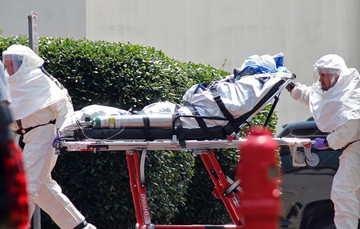UAlbany Experts Advisory: Ebola and U.S. Health System
ALBANY, N.Y. (October 8, 2014) -- An American freelance cameraman for NBC News who contracted the deadly Ebola virus in West Africa has arrived in the U.S. for treatment, while, health officials continue to monitor the situation in Dallas after a Liberian citizen, who had traveled to the U.S. to visit family, was found to have the disease and later died.
 |
|
The nation's health system is in the spotlight after a man traveling from Liberia was diagnosed with Ebola after traveling to the U.S.
|
Faculty experts at the University at Albany are available to discuss the threat Ebola poses to the U.S., how it compares to the flu virus, and how RNA technologies similar to the ones being developed at UAlbany’s RNA Institute, may impact the treatment and course of the disease.
- Dr. Peter Vellis serves as the medical director of the University Health Center. In this role, Dr. Vellis leads planning efforts to minimize the on-campus risk of threatening communicable diseases, consistent with the goals and objectives of the New York State Department of Health. Dr. Vellis can address how the Ebola virus is transmitted and its impact on the human body, as well as preventive steps to minimize the risk posed by the disease.
- Edward Waltz is a research associate professor in the Department of Health Policy, Management & Behavior and director of the Center for Public Health Preparedness and the NY/NJ Preparedness and Emergency Response Learning Center. He is an expert on emergency planning, public health needs assessment and program evaluation, disease surveillance systems and local public health services. Dr. Waltz can discuss the public health threat posed by Ebola versus more common illnesses, such as influenza.
- Paul Agris is the director of the RNA Institute at UAlbany. Agris is an expert on RNA-based drug therapeutics, structure/function relationships of nucleic acids, and the roles of modified nucleosides in tRNA. He can discuss how RNA-based approaches can be utilized to develop drug therapies to combat conditions similar to Ebola such as HIV, MRSA and drug-resistant bacterial infections.
![]() For more news, subscribe to UAlbany's RSS headline feeds
For more news, subscribe to UAlbany's RSS headline feeds
A comprehensive public research university, the University at Albany-SUNY offers more than 120 undergraduate majors and minors and 125 master's, doctoral and graduate certificate programs. UAlbany is a leader among all New York State colleges and universities in such diverse fields as atmospheric and environmental sciences, business, education, public health,health sciences, criminal justice, emergency preparedness, engineering and applied sciences, informatics, public administration, social welfare and sociology, taught by an extensive roster of faculty experts. It also offers expanded academic and research opportunities for students through an affiliation with Albany Law School. With a curriculum enhanced by 600 study-abroad opportunities, UAlbany launches great careers.


